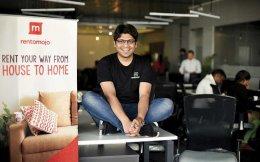Vijay Shekhar Sharma, founder and managing director of One97 Communications, can be called an early starter. A child prodigy, he passed class XII at the age of 14 and started his first business venture while doing his third year at engineering college. His company, Xs! Corporations, was later sold to Lotus Interworks in 1999. After working for Lotus for a year, he founded One97, which provides a platform for delivering mobile value-added services, in December 2000.
From starting with astrology forecasts over the phone in 2001 to becoming one of the largest mobile value added services players today, his company has come a long way. “I think we were lucky to enter this space early, which gave us a lot of opportunities to learn,” said Sharma. It was also tough to convince operators to put up One97’s platform.
“We disrupted this system by saying that platform must be free and only the applications must be charged, that too when customer is paying you the money,” he adds. Sharma borrowed money from friends in early days but now has private equity players from across the world knocking on his doors.
Today, One97 offers a range of services including personal care, m-commerce, messaging, networking and call management. It does over 20 million paid music downloads on its platform every month. The company, which is expecting revenues of $30 million in FY10, is now gearing up for its next move – a public offering in 2010. VCCircle talks to Sharma about the trends in the mobile VAS industry, One97’s acquisition and incubation strategy and expansion plans. Excerpts:-
Could you outline your expansion plans?
Our business is twofold: One, we have a platform supporting many applications. The reach of this platform keeps on increasing as more consumers get added on the network. We will have more or less default growth on this.
Two, we do applications on our platform. We are launching 3G social applications, utility-based services and ARPU (average revenues per user) management services. We have seen a number of applications gaining traction and we keep incubating new ones.
We were lucky to enter this space early, which gave us a lot of opportunities to learn. On our platform, we can do content to business critical applications.
Enterprise is a segment where we see a great uptick now. The mobile phone is becoming an integral part of an enterprise business process which includes things like getting a confirmation on business transaction. This market could give us revenues of $100 million in next two years. We think that this market will have 4-5 strong players.
What kind of products in the mobile value added services space do you see taking off?
Initially, mobile was mainly a talking device, then came messaging followed by entertainment and it is now headed towards a utility device. Now you are using your phone to do transactions, book tickets, read documents and so on. Phone is winning the war against other screens as it is more personal, convenient and executable. Virtually everything that you do on TV is now available on the phone. There is a huge jump even in areas like social networking over the phone.
We love this device in India because it didn’t go through the middle path like wire line. It gave a new meaning to freedom. We have 300 million users conducting five billion transactions on our platforms every month. We could easily be the largest direct-to-market company, largest music platform in the country. And there are so many of us. It continues to remain a great Indian telecom story and on top of that the consumer and enterprise story is being built up. Like telecom players had to deploy huge amount of towers to get customers, we have to deploy huge amount platform and applications.
There has always been a complaint from VAS players about the revenues sharing. What is your take on this?
You must have heard these complaints from content players and not from platform and service players like us.
We can survive even in this competitive environment where rivals are cutting us down. The problem is that we have an overstated pressure from operators. If you have a sincere cost and value on table, nobody pushes you to that extent. I think this is an overstated myth from the content guys.
I think there is a lot of revenue on the table. Consumers want a lot of services from the phone, which can either become a redundant pipe or an intelligent service delivery. People like us come in and enhance value.
For example, the per-second pulse has shaved off operators’ revenues. How do they recover the money from the same customers? This money has to go to the VAS industry. Such price wars add to the growth of the industry. If your Rs 160 bill falls to Rs 120, the remaining Rs 40 is there for VAS players to pick up. We have been growing at 100% year-on-year due to this.
Are you looking at mobile payments?
We have our commerce platform that is deployed with a few operators. We do pre-paid recharges, post paid bills and all commerce transactions. We have invested in a company called PayTM. A larger player like ours can incubate such smaller and niche ideas. The idea is to have this whole large ecosystem relationship with consumers which can be leveraged by many. We would like to be someone like Cisco with a core business and then having everything that surrounds it.
Do you think operators will ever go for backward integration?
It’s a skills game. It’s not like a call centre which is predictable and easy to integrate. They might invest, incubate, try to create structures that might make it possible.
Will you look at any acquisitions going ahead?
Our acquisition strategy is simple – you need great applications and great consumer plays. For that, we are making sure we build some, we invest in some companies and we also acquire some companies. But I don’t think there are many quality assets in the market. We won’t be looking to acquire companies overseas to get a foothold into those markets. Our products already have a great traction and we have a lot of growth in Indian markets also. We might acquire companies for great products but not for customers. Mature and fast growing telecom markets have shown great traction for our products. The European markets, which are in need for models like ours, have accepted our products.
What do you think is working for you in markets like Europe?
We never try to sell technology. We say we will solve one of your problems or bring extra revenue for you. The revenue-sharing approach--which is needed to survive in the Indian markets--works for cash-strapped European players. We assure them a minimal 300% cost savings.
Given the synergies, will you look at buying Internet properties?
Consumers will prefer mobile phone and internet will become relevant on mobile for this country. Internet companies will be targeted but will they truly be needed? That’s a 24-month ahead story. Internet is a very different business today. It will have more relevance from being delivered on the mobile phone. There is nothing for us there yet but we definitely keep an eye on it.
Do you see consolidation coming in the Indian VAS space?
Some companies are definitely not growing. You have to have multiple products whereas most companies in this space are dependent upon one or two products. If those applications stop working or start stagnating, you have nothing else to stick to. The mobile VAS sector is a cottage industry with only a few large players. This means that whenever there is a worthy enough company of a particular size, it will be bought over.
But has that trend started?
There are many companies on the table. Consolidation doesn’t necessarily mean a willingness to sell but a willingness to buy as well.
But if you see a great content firm will you go aggressively after it?
Our platform is agnostic to our content play. All content is made available through this platform. Content is still not a differentiator in the market yet. If content is King, platform is the king-maker.






